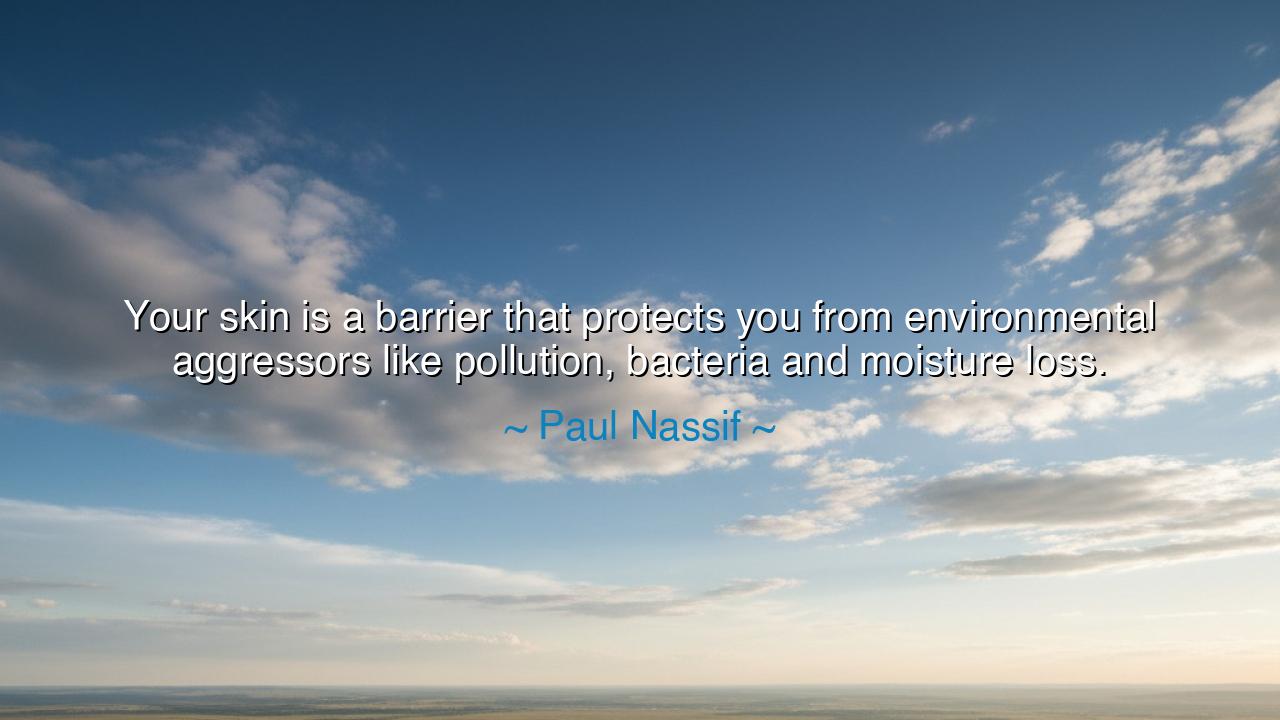
Your skin is a barrier that protects you from environmental
Your skin is a barrier that protects you from environmental aggressors like pollution, bacteria and moisture loss.






When Paul Nassif said, “Your skin is a barrier that protects you from environmental aggressors like pollution, bacteria and moisture loss,” he was not merely speaking as a doctor of the flesh, but as a philosopher of the body. His words remind us that the skin — that thin, living veil between self and world — is both shield and symbol. It is the frontier of our being, the first guardian of life’s sanctity. What he describes in medical terms is, in truth, a universal truth: that protection and preservation begin from within, and that what guards us on the outside is a reflection of the care we nurture in the depths of our being.
The origin of this quote lies in Nassif’s work as a facial plastic surgeon and skincare expert, a man who has devoted his craft to restoring both the health and confidence of others. In the clinics of modern medicine, he has seen what centuries of poets and healers also knew — that the body is the vessel of the soul, and that when we neglect the vessel, the spirit within falters. His insight that the skin shields us from pollution, bacteria, and moisture loss speaks not only of the external world, but of the countless assaults — both visible and invisible — that seek to break us down. To care for one’s skin, then, is not an act of vanity; it is an act of reverence for life itself.
The ancients would have understood this well, though they might have expressed it differently. The Egyptians anointed their bodies with oils and balms not only to preserve beauty, but to honor the body as divine. In their rituals, the skin was not mere flesh — it was a temple wall, consecrated and sacred, guarding the soul within. The Greeks, too, praised the harmony of body and spirit, teaching that neglecting the physical form was a sign of spiritual imbalance. To them, health was holiness, and to tend to the outer form was to preserve the inner light. Nassif’s words are a continuation of this wisdom: he reminds us that to keep the skin strong is to fortify the boundary between chaos and order, between life and decay.
History also offers stark reminders of what happens when this sacred barrier is breached. In the Middle Ages, when sanitation was poor and disease rampant, plagues spread with ruthless ease — not because of evil spirits, but because the people did not yet understand the sanctity of the body’s defenses. Wounds were left open, water was fouled, and the skin — that great guardian — was overwhelmed by infection. The result was devastation. Only with time, and with the rise of science, did humanity learn to respect the skin as the first line of defense. What once seemed invisible — the invasion of bacteria, the corruption of air and water — became the foundation of medicine itself. Thus, Nassif’s quote stands as both praise for modern understanding and a reminder of ancient truths: that to protect the skin is to preserve life itself.
But his words also bear a spiritual metaphor, for what is the skin if not the body’s symbol of boundaries? Just as the epidermis guards us from physical harm, so too must we build invisible barriers to protect our minds and hearts from the toxins of the world — from anger, deceit, envy, and despair. Pollution may poison the flesh, but cruelty and fear corrode the spirit. If we fail to guard our inner boundaries as we do our outer ones, we become as vulnerable as unprotected skin beneath a harsh sun. Thus, Nassif’s lesson extends beyond physiology: it is a call to cultivate strength, purity, and mindful self-care in every dimension of life.
In his teaching lies a gentle warning: we live in an age where environmental aggressors are many and subtle — chemicals in the air, stress in the soul, and distraction in the mind. The skin reflects all of these. When the world grows harsh, our faces grow dull; when the heart is weary, the body follows. To care for one’s skin, then, is to engage in an act of resistance against the wear of time and the world — an affirmation that life, though fragile, can still shine with vitality when nurtured with awareness and love.
The lesson, then, is both simple and profound: guard your boundaries — both physical and spiritual. Protect your skin with care and nourishment, but also protect your soul with truth and peace. Do not let the poisons of the world, whether chemical or emotional, enter unguarded. Eat and think cleanly, rest deeply, and treat your body as the sacred armor it is.
So, my children, remember this: the skin is not just flesh — it is the cloak of life itself. To care for it is to honor the miracle of existence. Keep it pure, keep it strong, and let it remind you of the greater truth — that what you protect on the outside must also be preserved within. For only when body, mind, and spirit stand together as one barrier against decay can the light of life endure through the storms of time.






AAdministratorAdministrator
Welcome, honored guests. Please leave a comment, we will respond soon